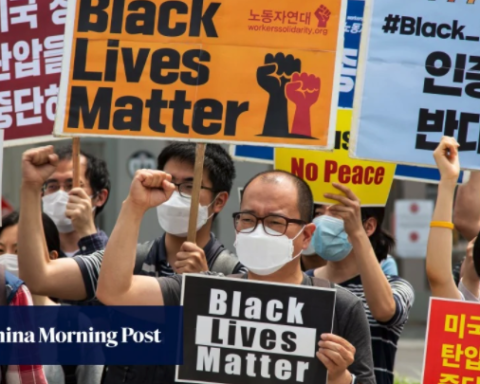“Hope the block is still standing.”
“We’re still standing.”
The above is a conversation between two of Spike Lee’s characters in one of the most important and necessary films to date, “Do the Right Thing.” If you haven’t seen the film, the conversation sits between Mother Sister, and “Da Mayor.” The two lines appear after the previous night’s riot, which may be one of the most well thought out scenes from what we consider today’s modern directors. Some of course include Alfanso Cuaron, Martin Scorcese, Greta Gerwig and several others. However, none are like Spike Lee. None can twist a story about so much into two hours and five minutes.
No film is more relevant to the current BLM movement. That is of course because of the conflict of what is right and what is wrong when it comes to the politics of racism. The message of course, which is that you should always bring it back to what’s right; equality for all still stands today.
Spike Lee isn’t the only Black director worthy of recognition. (Then this article would be less than a paragraph short and may be titled, “Spike Lee: the only important Black person in film!”) Spike Lee is not the only modern Black film director that is mentionable, even if he may be the most famous. In 2017, about two years after the #OscarsSoWhite controversy exploded around the world, the producers of a film called “Moonlight” came up onto a large stage where they rightly won a batch of golden statues; they had won best picture after a large mix-up. (Lala Land had mistakenly won and they, in turn, had to hand over the Oscars to the producers of “Moonlight”).
“Moonlight” was clearly a great film, most likely the greatest of that year. Including many other things, it featured a discussion of the movement itself that almost struck straight into philosophy. It wasn’t just a silly oscar campaign.
I was worried when I thought of the idea of this article. I am white and the critic I am interviewing is white. I am aware of the White Saviour issue and us taking part in a Black conversation. The critic is a film expert, though, which makes me excited and we’ll both try to be as self-aware through the conversation as possible.
I couldn’t make an interview happen with Spike Lee himself, so I interviewed Chase Granoff, formerly of the Film Forum, but “Chase who used to work at the Film Film Forum” isn’t his title. It was around 1p.m. I was nervous. I had seen his son just about a handful of months ago when they were both at my home. I had no idea what Granoff’s relations to films and the Black Lives Matter Movement was.
I sat next to the phone below, where no outside noise could catch me. The calm voice of Granoff vibrated out of the phone. At this point I was already regretting not recording it.
“Well, I think I should be able to look at a movie and look at its achievements, but also keep in mind that if it’s a racist movie, we name it as such.” He slowed down each word, giving much more meaning to everything he said with one simple twist in a change of voice. “I think we should acknowledge that it’s racist, but also know what’s good about it.” I slowly sank deeper into the mattress under me, while the interview took hold of every empty space in my head. “Like with ‘Gone With The Wind,’ I hope that before we can watch outdated movies,” he said, walking on dangerous words, “there can be a ‘this is why this movie is racist’ kind of thing, just so you know.”
Before we started the interview he mentioned a film, “Just Mercy,” with Micheal B. Jordan and Jamie Foxx. I remember the film’s ads which would sit on the side of a map at a bus stop that I’d occasionally use. It’s funny that he brought it up because when making a list of “Black Lives Matter Films” (which Granoff believes does not have to be a genre, or course) I had thought no one had heard of it.
I asked what kind of Black Lives Matter films we should be watching at this time and he was quick to answer. “Well, I think a variety. Me and Nacho [Ignacio, his son, a dear friend of mine] watched ‘Just Mercy’ the other day, which is like a family friendly movie, but he also watched ‘13th’ with his mom.” 13th is an hour and forty minute documentary directed by Ava DuVernay that focuses on the terribly long history of racial inequality of Black people. It won a British Academy for Film and Television Arts (BAFTA) award for documentary and is available on Netflix in the “Black Lives Matter Collection.” Granoff notes, “It’s intense and I think it’s important to watch both.”
Recently, the 2011 film “The Help,” starring Emma Stone, Viola Davis and Octavia Spencer, reached Number One on Netflix’s “Top Ten Popular” list. Interestingly enough, a while later, Netflix released their “Black Lives Matter” films and TV collection. I put that in quotes because “Black Lives Matter” is not a genre. With this Top Ten Netflix promotes any film that is popular. There, at number one stood a clear White Savior film for you to watch, instead of the “Black Lives Matter” collection. White Saviorism is best expressed in a 19th century poem, “The White Man’s Burden,” by Rudyard Kipling. A White Saviour is a white person so-called helping a Black person. What’s so bad about that? It perpetuates the idea that Black people are desperately in need of the help of white people, and otherwise have inferior values or ideas. So here we are, Netflix controversially promoting lies, then covering it up with a collection that strips away the story and the acting and every component that goes into the film, every bit of hard work, and simply makes it “A Black Lives Matter Film.” “Well I don’t think that they should be part of the collection,” Granoff states, speaking of White Saviour film, specifically signaling to “The Help.” “They’re kind of white washing these important stories.” Could Netflix really promote White Washing? There’s no doubt that they have. What has Netflix gone to? Is it entertainment? Is it a political statement backfired? Is it the promotion of White Washing? “Yeah, they’re anti-racist, but they’re saying that Black people need help and it’s kind of just supporting racism today. So no, they’re not ‘Black Lives Matter Films.’”
“I think there’s always a chance for more growth and improvement,” Granoff says, when asked about the representation of Black people, characters and stories in modern day film; spanning from a collection by Netflix to the famously racist “The Birth Of A Nation” by W.B. Griffiths. Of course, racism in film is always a dangerous subject. Even Roger Ebert put Griffiths “Broken Blossoms” in his first “The Great Movies” book instead of “The Birth Of A Nation,” which is simultaneously one of the most racist films of all time and a technical masterpiece among a majority of film buffs. He waited for book two to acknowledge that he himself was scared that people would criticize his choice and dedicated seven pages to its success and controversies. “I think if we can get to a point where these are not ‘Black Lives Matter’ movies, and they can just be good movies, that would be great,” he said. His overhaul point I started with. That there are not “Black Lives Matter” directors, but instead just good directors. Spike Lee is not a “Black Lives Matter” filmmaker, but a filmmaker whose filmography centers around a variety of different stories and ideas on being African American. It is not about “Black Lives Matter” filmmakers, but instead about directors who discuss Black lives. “Black Lives Matter” isn’t a label or something that you can brand because it is a belief that every race is equal. Granoff remarks, “We shouldn’t have to have a separate category for people to enjoy these movies. They should just be considered good movies. I think that it’s important that, like ‘Moonlight,’ we have more of these Black directors and these all Black cast films, and they don’t have to be called ‘Black Lives Matter’ movies, but are just mainstream, good movies.”
There is no such thing as “Black Lives Matter” films because Black Lives Matter is not a brand, it’s a movement. The branding of a serious topic is unnecessarily glorifying a painful experience. As long as films that depict Black lives are branded as “Black Lives Matter” films then there is no power in the phrase or movement for the film world. We must change this.







